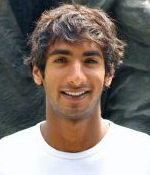 The clock definitely will be ticking for Karthik Reddy '10 when he studies the effects of store-closing times in Berlin, Germany, this summer, thanks to a German Academic Exchange Service (Deutscher Akademischer Austausch Dienst or DAAD) grant.
The clock definitely will be ticking for Karthik Reddy '10 when he studies the effects of store-closing times in Berlin, Germany, this summer, thanks to a German Academic Exchange Service (Deutscher Akademischer Austausch Dienst or DAAD) grant.
Until 2004, Germany had nationwide regulations called the Ladenschlussgesetz that prevented retail stores from operating during evenings or on weekends. Supporters of these laws asserted that they were necessary to protect the welfare of workers. However, in 2004, some states changed these regulations and permitted stores to open during evenings, Saturdays, and some Sundays.
Reddy's grant will enable him to carry out a research project that will seek to measure the economic effect of liberalizing these laws, with an eye toward the impact the store-closing time changes have had on the working poor.
"Germany is a fascinating country with a tremendous amount of history that offers an unparalleled learning experience," Reddy says. "It was the birthplace of a moral and political philosophy that is quite different from our Anglo-American philosophical tradition.
"Germany has flirted with numerous forms of government and economic systems, and is an integral player in an ongoing experiment in transnational union," he adds. "Winning this grant enables me to study in, and experience firsthand, this natural laboratory of philosophy, politics, and economics."
Reddy learned about the DAAD award from Marc Katz, a professor of German at Scripps College. "He was my first German teacher in college and had a substantial influence on my interest in going to Germany as a student for a semester in 2008," Reddy says. "In Berlin, I'll conduct my research project with Dr. Andreas Knabe, a professor of political economy at the Freie Universitat Berlin."
Reddywho also will study economics and public law at the Freie Universit?tis looking forward to getting back to Germany. In fact, the inclement weather there (compared to Southern California's bountiful year-round sunshine) gave him the idea for the research project.
"I visited Germany for the first time during the winter and, as a typical Southern Californian, realized I had not packed gloves or a heavy coat," the CMCer recalls. "I immediately went to the nearest shopping center to purchase these, but found that because it was Sunday, all of the stores were closed. To my surprise, I learned through conversations with Germans that many people support the mandatory closures which they believe necessary to protect the welfare of workers."
Having studied economics at CMC, Reddy says he suspected that the workers were economically disadvantaged by the regulations.
"I hope to further investigate their implications for the economic and social well being of workers, and contribute meaningful information to the debate surrounding the laws that nearly froze my fingers."
DAAD is the German national agency for the support of international academic cooperation. It offers programs and funding for students, faculty, researchers and others in higher education as well as providing financial support to over 55,000 individuals per year. DAAD also represents the German higher education system abroad, promoting Germany as an academic and research destination, and helping to build ties between institutions around the world.
Much 'In Store' for Winner of
DAAD Research Award
